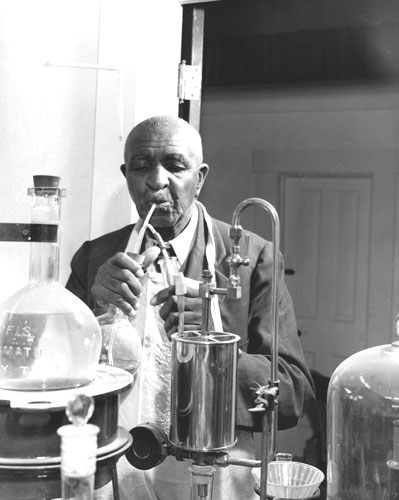GEORGE WASHINGTON CARVER
One of the 20th century’s greatest scientists is George Washington Carver, whose influence is still widely felt today. Rising from slavery to become one of the world’s most respected and honored men, he devoted his life to understanding nature and the many uses for the simplest of plant life. He is best known for developing crop-rotation methods for conserving nutrients in soil and discovering hundreds of new uses for crops such as the peanut.
As an agricultural chemist, Carver discovered three hundred uses for peanuts and hundreds more uses for soybeans, pecans and sweet potatoes. His scientific genius is responsible for many household improvements we all use today, including: adhesives, axle grease, bleach, buttermilk, chili sauce, fuel briquettes, ink, instant coffee, linoleum, mayonnaise, meat tenderizer, metal polish, paper, plastic, pavement, shaving cream, shoe polish, synthetic rubber, talcum powder and wood stain.
 George Washington Carver was born in 1864 near Diamond Grove, Missouri on the farm of Moses Carver. He began his formal education at the age of twelve, which required him to leave the home of his adopted parents. Since schools were segregated by race at that time with no school available for black students near his home, Carver moved to Newton County in southwest Missouri where he worked as a farm hand and studied in a one-room schoolhouse. He went on to attend Minneapolis High School in Kansas, and at the age of thirty gained acceptance to Simpson College in Indianola, Iowa, where he was the first black student. Carver had to study piano and art since the college did not offer science classes. But intent on a science career, he later transferred to Iowa Agricultural College (now Iowa State University) in 1891, where he gained a Bachelor of Science degree in 1894 and a Master of Science degree in bacterial botany and agriculture in 1897. Carver became a member of the faculty of the Iowa State College of Agriculture and Mechanics (the first black faculty member for Iowa College), teaching classes about soil conservation and chemurgy.
George Washington Carver was born in 1864 near Diamond Grove, Missouri on the farm of Moses Carver. He began his formal education at the age of twelve, which required him to leave the home of his adopted parents. Since schools were segregated by race at that time with no school available for black students near his home, Carver moved to Newton County in southwest Missouri where he worked as a farm hand and studied in a one-room schoolhouse. He went on to attend Minneapolis High School in Kansas, and at the age of thirty gained acceptance to Simpson College in Indianola, Iowa, where he was the first black student. Carver had to study piano and art since the college did not offer science classes. But intent on a science career, he later transferred to Iowa Agricultural College (now Iowa State University) in 1891, where he gained a Bachelor of Science degree in 1894 and a Master of Science degree in bacterial botany and agriculture in 1897. Carver became a member of the faculty of the Iowa State College of Agriculture and Mechanics (the first black faculty member for Iowa College), teaching classes about soil conservation and chemurgy.
In 1897, Booker T. Washington, founder of the Tuskegee Normal and Industrial Institute for Negroes, convinced Carver to come south and serve as the school’s Director of Agriculture. Carver remained on the faculty until his death in 1943.






